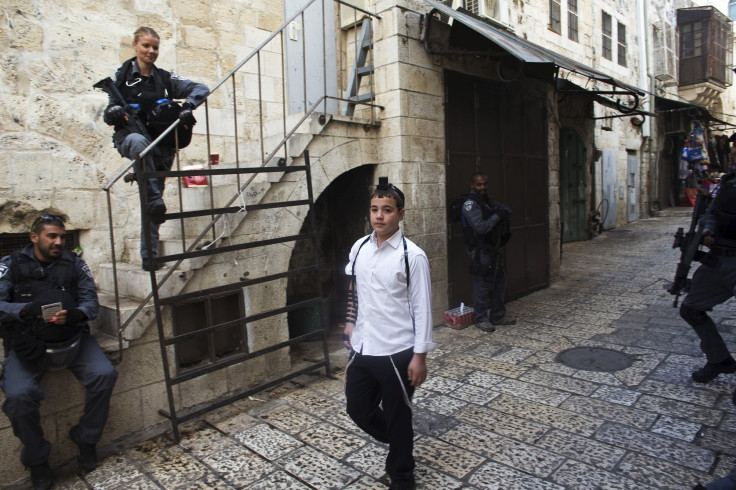Jerusalem Metal Detectors For Muslims? Israeli Police Install Devices In Old City Quarter Amid Increasing Violence, Stabbings

Amid increased tensions and a number of recent stabbing attacks, the Israeli Police installed metal detectors Thursday in and around the Old City area of Jerusalem. The devices were primarily placed on roads surrounding the Muslim Quarter of the Old City, the Times of Israel reported.
The move was decided by Israeli Public Security Minister Gilad Erdan, police said. “The detectors are being placed in line with security assessments, field analysis and threats, in order to bolster security for city residents and its many visitors,” a police statement read, via the Times of Israel.
The detectors have been placed at the Jaffa Gate, Damascus Gate, Hashalshelet Street, the Via Dolorosa and Hagai Street, which has been the site of two separate recent stabbings, including an attack Saturday that killed two Israelis, Aharon Banita and Nehemia Lavi.
Israeli police putting metal detectors at various gates in the Old City of Jerusalem (pics via Chrstine Rinawi) pic.twitter.com/EOy9a5SDue
— Dalia Hatuqa (@DaliaHatuqa) October 8, 2015
Tensions have grown in Jerusalem and the Palestinian West Bank as protests against Israeli policies at the Al-Aqsa mosque have spread. There's been an uptick in violence, especially stabbings. An Israeli student was stabbed Thursday. Later, four people, including an Israeli soldier, were stabbed near a military headquarters in Tel Aviv, Reuters reported. The assailant was later shot and killed by police.
Following the Tel Aviv attack, a Palestinian stabbed and wounded a man in the Jewish settlement of Kiryat Arba in the occupied West Bank. Four Israel citizens have been killed in the past week. Several Palestinians have been killed, scores more injured, in clashes with security forces, including a 13-year-old boy in a refugee camp who was shot by Israeli Defense Forces, CNN reported.
Jerusalem Mayor Nir Barkat on Thursday encouraged all citizens with a gun license to carry a weapon, a call also backed by Deputy Defense Minister Eli Ben-Dahan. “It’s like doing reserve duty,” Barkat said during an interview with Army Radio Thursday morning, according to Ha'aretz.
“Every time there is tension, I instruct people who are allowed to carry weapons and are experienced in using them to carry their guns with them," Barkat told the Times of Israel.
© Copyright IBTimes 2024. All rights reserved.






















